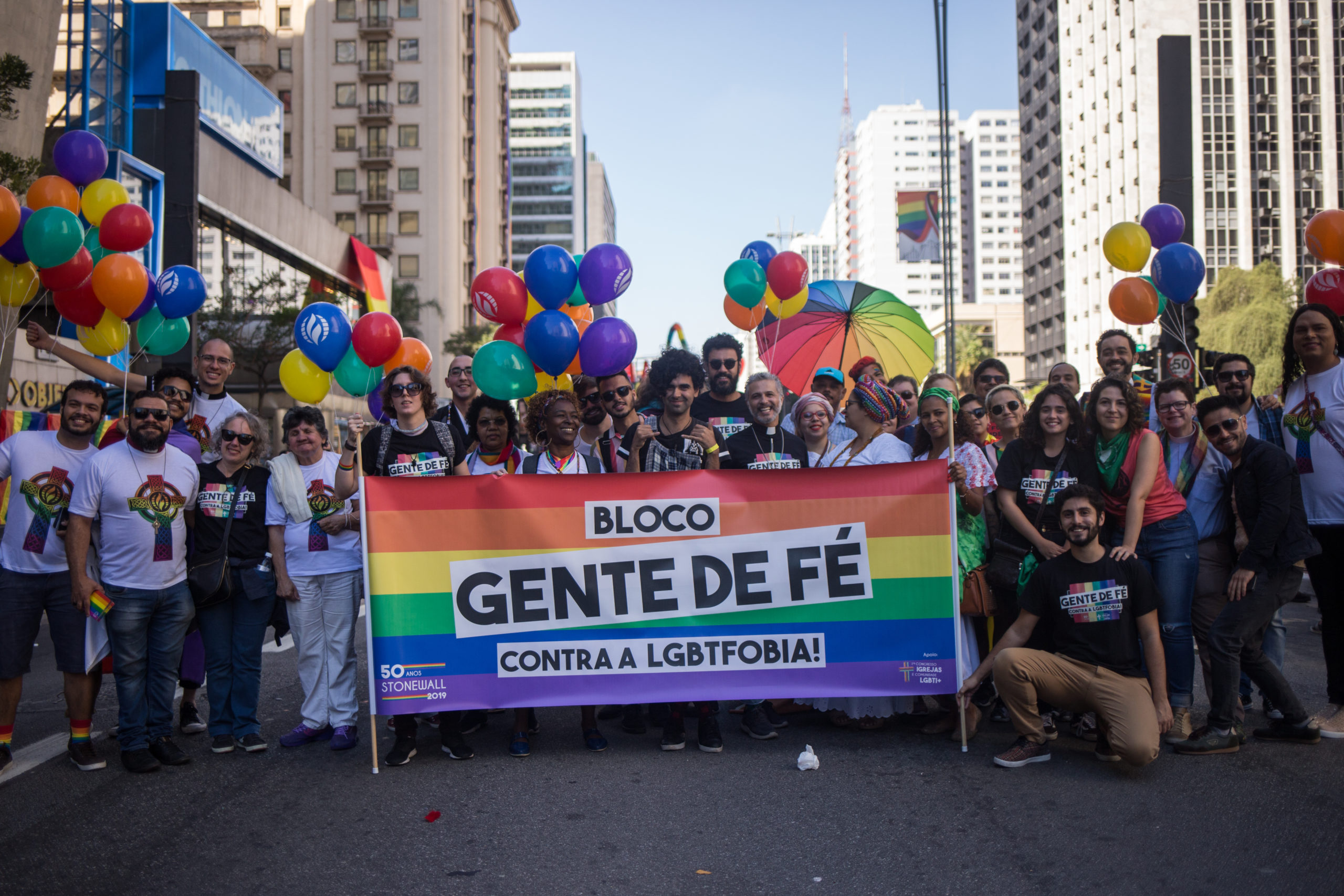Religious LGBTI+ and the importance of the dispute for space
Diversity in faith: the discourse that places religion and people who transgress sexual and gender norms on opposite sides should not be considered absolute
 Religiosos LGBTI+ e aliados na Parada do Orgulho LGBT, em São Paulo, no ano de 2019. Foto: Julio Cesar Silva/ Divulgação/KOINONIA
Religiosos LGBTI+ e aliados na Parada do Orgulho LGBT, em São Paulo, no ano de 2019. Foto: Julio Cesar Silva/ Divulgação/KOINONIA
For the singer and actress Linn da Quebrada, the sacred is one of the many spaces from which transvestites are excluded. “I like to think that we are all unique in the eyes of God. This is why I can only believe in a God that also believes in my existence,” she said, in an interview with the newspaper O Globo. “I try to create in music a space for us to rethink the sacred, as a process of healing our bodies, of taking care of our spirit.”
In different ways and in different contexts, not only transvestites and trans people, but also gays, lesbians, bisexuals, non-binary and other people who transgress sexual and gender norms also feel the impact of exclusion from sacred spaces.
According to Maryuri Grisales, an advisor for the Strengthening Democratic Space program at Conectas who heads up the organization’s Religious Mobilizations and Rights Agenda initiative, the LGBTphobic discourse from religious leaders on behalf of a divine authority has a big influence. “When someone says you are going to hell because of your sexual conduct, many people may not care, but deep down there is a connection with the symbolic religious universe that was built over the course of life, in the family, at school, in our day-to-day routines. This discourse creates the idea that you are totally outside of universal law, outside the faith, outside the norm and of what is considered acceptable,” she said.
Read more
According to Grisales, this discourse has had real effects that are visible in the numbers of murders and suicides of LGBTI+ people, in domestic violence and in the difficulty finding a job. These matters are often related to narratives involving a rejection of the existence and sacredness of these lives.
In 2020, according to the latest report from the organization Grupo Gay da Bahia, 237 LGBTI+ people suffered violent deaths in Brazil, 94.5% of them due to homicide and 5.5% from suicide. In absolute numbers, deaths were recorded of 161 transvestites and trans people, 51 gays, ten lesbians, three trans men, three bisexuals and two heterosexual men mistaken for being gay.
Fundamentalist impact
“I am a Candomblé woman and a lesbian. The only reason I’m married is because the Supreme Court guaranteed the possibility of union between same-sex couples,” said the lawyer Laina Crisóstomo, a joint city councilor of the shared mandate Black Women for Salvador, formed by evangelical and Candomblé women. “In Brazil, LGBTI+ victories have been achieved through the Supreme Court, which is not the natural course of the legislative process. This, undoubtedly, is a reflection of how the political discourse of the fundamentalist caucus impacts our lives.”
According to the joint city councilor, it is necessary to deconstruct the false dichotomy that creates a rift between religiosity and people who transgress sexual and gender norms. “There is no contradiction between being religious and being LGBTI+; what exists is the need for us to combat the discourses that oppress us. I can’t be part of a religion if it tries to put me back in the closet,” she said. “We need to be accepted in our religion, because this has to do with our ancestry, our spirituality.”
Cris Serra, who runs the National Network of Catholic LGBT Groups, describes some of the violence and aggression that commonly occurs in Catholic environments, such as prayers of liberation and exorcisms. “This discourse creates the idea that an LGBT person is unclean, unworthy of loving and of being loved by God,” she said. “It is devastating emotional, spiritual and psychological symbolic violence.”
According to Serra, although religious violence is real, it is important to challenge the spaces of religious power. “We need to realize that the field of ecclesiology is more diverse than this homogeneity that the official discourse tries to push on us. Accepting this supposed homogeneity only serves the interests of the authorities that want to impose this discourse as the only possible truth within the Church, by erasing voices that think and feel differently.”
Protestants against the norm
In the Protestant context – consisting of different segments, including evangelical churches – it is also possible to find spaces to practice a faith based on diversity. “One of the greatest achievements of the Protestant Reformation is Luther’s understanding that each person should have their own experience with the biblical text. In other words, there is no one single way to be evangelical in the world,” said Reverend Bob Luiz Botelho, the general coordinator of the group Evangelicals for Diversity.
Like Serra, Botelho also identifies LGBTphobia in some of the Christian discourse and understands its impact on people’s lives, but he thinks it is important to make your presence felt and declare your existence. “It’s important to create this tension, to generate debate and discomfort. Lots of people tell us not to waste our time with a faith that does not accept us, but for a long time the State did not accept us either. And you can’t give up on the State, so I challenge the State. In the same way, let’s not give up on the religious world. To give up is to hand power to those who attack us.”






